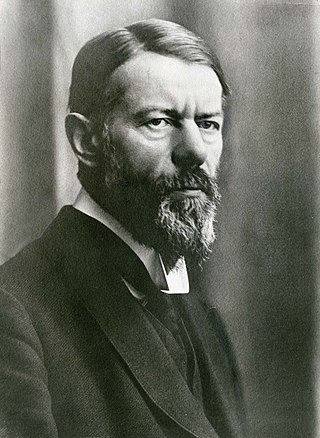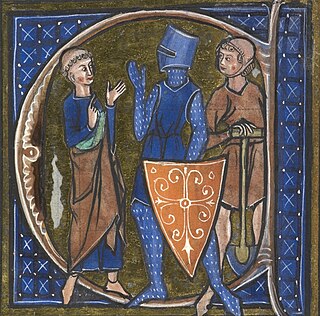
Maximilian Karl Emil Weber was a German sociologist, historian, jurist, and political economist who was one of the central figures in the development of sociology and the social sciences more generally. His ideas continue to influence social theory and research.

Authority is commonly understood as the legitimate power of a person or group over other people. In a civil state, authority is practiced by the legislative, executive, and judicial branches of government. The term authority has many nuances and distinctions within various academic fields ranging from sociology to political science.
In the field of sociology, charismatic authority is a concept of organizational leadership wherein the authority of the leader derives from the personal charisma of the leader. In the tripartite classification of authority, the sociologist Max Weber contrasts charismatic authority against two other types of authority: (i) rational-legal authority and (ii) traditional authority.

Political sociology is an interdisciplinary field of study concerned with exploring how governance and society interact and influence one another at the micro to macro levels of analysis. Interested in the social causes and consequences of how power is distributed and changes throughout and amongst societies, political sociology's focus ranges across individual families to the state as sites of social and political conflict and power contestation.

In political science, legitimacy is the right and acceptance of an authority, usually a governing law or a regime. Whereas authority denotes a specific position in an established government, the term legitimacy denotes a system of government—wherein government denotes "sphere of influence". An authority viewed as legitimate often has the right and justification to exercise power. Political legitimacy is considered a basic condition for governing, without which a government will suffer legislative deadlock(s) and collapse. In political systems where this is not the case, unpopular regimes survive because they are considered legitimate by a small, influential elite. In Chinese political philosophy, since the historical period of the Zhou dynasty, the political legitimacy of a ruler and government was derived from the Mandate of Heaven, and unjust rulers who lost said mandate therefore lost the right to rule the people.

"Politics as a Vocation" is an essay by German economist and sociologist Max Weber (1864–1920). It originated in the second lecture of a series he gave in Munich to the "Free Students Union" of Bavaria on 28 January 1919. This happened during the German Revolution when Munich itself was briefly the capital of the Bavarian Socialist Republic. Weber gave the speech based on handwritten notes which were transcribed by a stenographer. The essay was published in an extended version in July 1919, and translated into English only after World War II. The essay is today regarded as a classic work of political science and sociology.
Rational-legal authority is a form of leadership in which the authority of an organization or a ruling regime is largely tied to legal rationality, legal legitimacy and bureaucracy. The majority of the modern states of the twentieth and twenty-first centuries are rational-legal authorities, according to those who use this form of classification.

Traditional authority is a form of leadership in which the authority of an organization or a regime is largely tied to tradition or custom. The main reason for the given state of affairs is that "things have always been that way".
Patrimonialism is a form of governance in which all power flows directly from the ruler. There is no distinction between the public and private domains. These regimes are autocratic or oligarchic and exclude the lower, middle and upper classes from power. The leaders of these countries typically enjoy absolute personal power. Usually, the armies of these countries are loyal to the leader, not the nation.

This is a chronological list of works by Max Weber. Original titles with dates of publication and translated titles are given when possible, then a list of works translated into English, with earliest-found date of translation. The list of translations is most likely incomplete.
In political science, sultanism is a form of authoritarian government characterized by the extreme personal presence of the ruler in all elements of governance. The ruler may or may not be present in economic or social life, and thus there may be pluralism in these areas, but this is never true of political power.
In sociology, the term rationalization was coined by Max Weber, a German sociologist, jurist, and economist. Rationalization is the replacement of traditions, values, and emotions as motivators for behavior in society with concepts based on rationality and reason. The term rational is seen in the context of people, their expressions, and or their actions. This term can be applied to people who can perform speech or in general any action, in addition to the views of rationality within people it can be seen in the perspective of something such as a worldview or perspective (idea). For example, the implementation of bureaucracies in government is a kind of rationalization, as is the construction of high-efficiency living spaces in architecture and urban planning. A potential reason as to why rationalization of a culture may take place in the modern era is the process of globalization. Countries are becoming increasingly interlinked, and with the rise of technology, it is easier for countries to influence each other through social networking, the media and politics. An example of rationalization in place would be the case of witch doctors in certain parts of Africa. Whilst many locals view them as an important part of their culture and traditions, development initiatives and aid workers have tried to rationalize the practice in order to educate the local people in modern medicine and practice.
Neopatrimonialism is a system of social hierarchy where patrons use state resources to secure the loyalty of clients in the general population. It is an informal patron–client relationship that can reach from very high up in state structures down to individuals in small villages.
In sociology, the iron cage is a concept introduced by Max Weber to describe the increased rationalization inherent in social life, particularly in Western capitalist societies. The "iron cage" thus traps individuals in systems based purely on teleological efficiency, rational calculation and control. Weber also described the bureaucratization of social order as "the polar night of icy darkness".

Legitimation crisis refers to a decline in the confidence of administrative functions, institutions, or leadership. The term was first introduced in 1973 by Jürgen Habermas, a German sociologist and philosopher. Habermas expanded upon the concept, claiming that with a legitimation crisis, an institution or organization does not have the administrative capabilities to maintain or establish structures effective in achieving their end goals. The term itself has been generalized by other scholars to refer not only to the political realm, but to organizational and institutional structures as well. While there is not unanimity among social scientists when claiming that a legitimation crisis exists, a predominant way of measuring a legitimation crisis is to consider public attitudes toward the organization in question.

Various sociological classifications of religious movements have been proposed by scholars. In the sociology of religion, the most widely used classification is the church-sect typology. The typology is differently construed by different sociologists, and various distinctive features have been proposed to characterise churches and sects. On most accounts, the following features are deemed relevant:

Bureaucracy is a system of organization where decisions are made by a body of non-elected officials. Historically, a bureaucracy was a government administration managed by departments staffed with non-elected officials. Today, bureaucracy is the administrative system governing any large institution, whether publicly owned or privately owned. The public administration in many jurisdictions is an example of bureaucracy, as is any centralized hierarchical structure of an institution, including corporations, societies, nonprofit organisations, and clubs.

In sociology, authority is the legitimate or socially approved power which one person or a group possesses and practices over another. The element of legitimacy is vital to the notion of authority and is the main means by which authority is distinguished from the more general concept of power.
In a notable study of power conducted by social psychologists John R. P. French and Bertram Raven in 1959, power is divided into five separate and distinct forms. They identified those five bases of power as coercive, reward, legitimate, referent, and expert. This was followed by Raven's subsequent addition in 1965 of a sixth separate and distinct base of power: informational power.
Charisma is a personal quality of presence or charm that other people find psychologically compelling. In the fields of sociology and political science, psychology and management the term charismatic describes a type of leadership. In Christian theology, the term charisma appears as the Spiritual gift (charism) which is an endowment with an extraordinary power given by the Holy Spirit.










